Unit 12 What did you do last weekend? Section B 1a-2c
文档属性
| 名称 | Unit 12 What did you do last weekend? Section B 1a-2c | 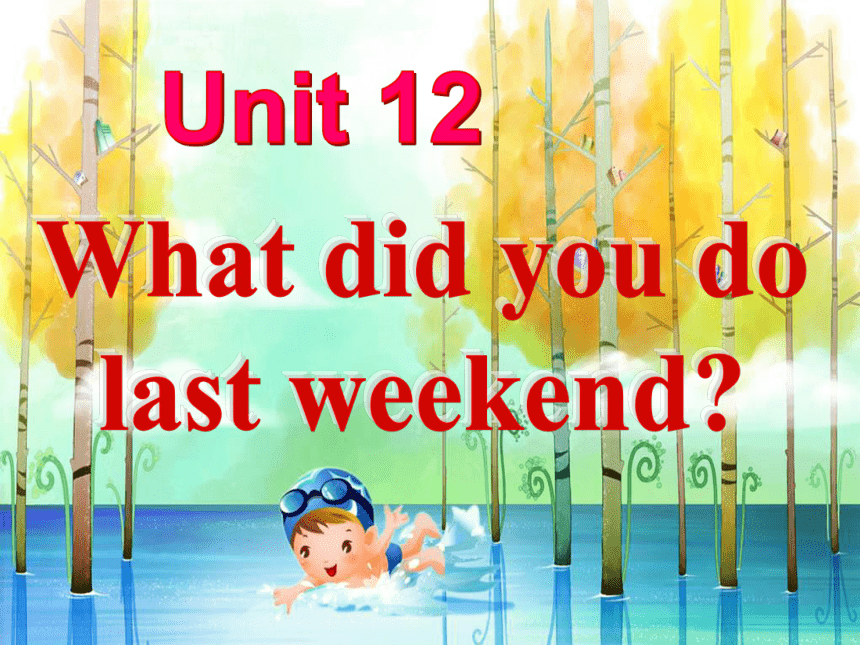 | |
| 格式 | zip | ||
| 文件大小 | 4.4MB | ||
| 资源类型 | 教案 | ||
| 版本资源 | 人教新目标(Go for it)版 | ||
| 科目 | 英语 | ||
| 更新时间 | 2013-06-14 15:33:47 | ||
图片预览

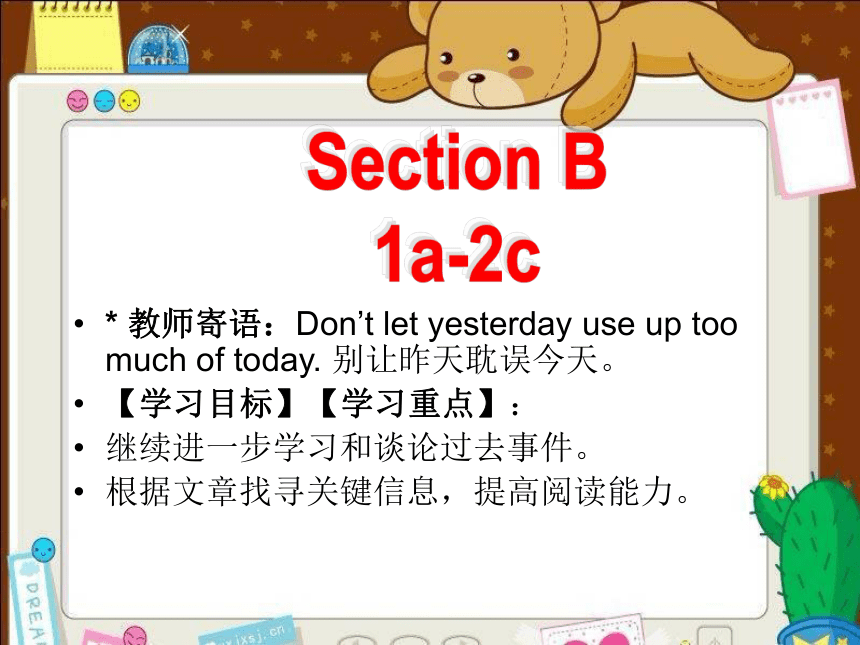
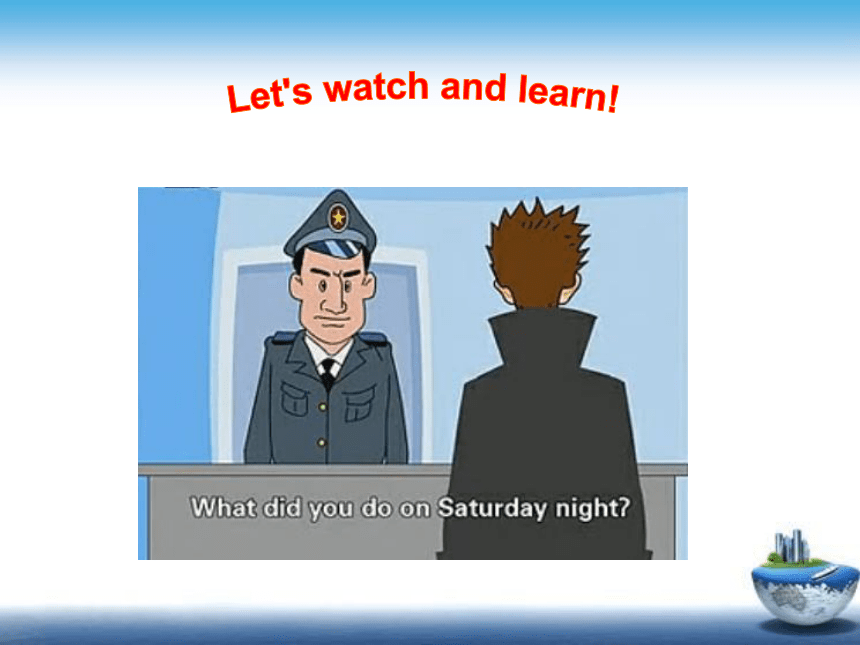

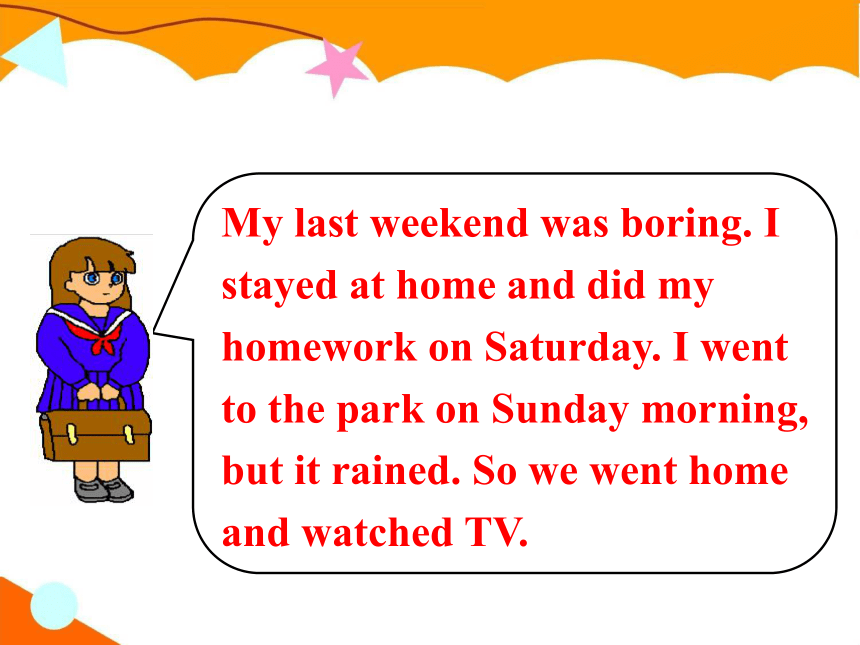
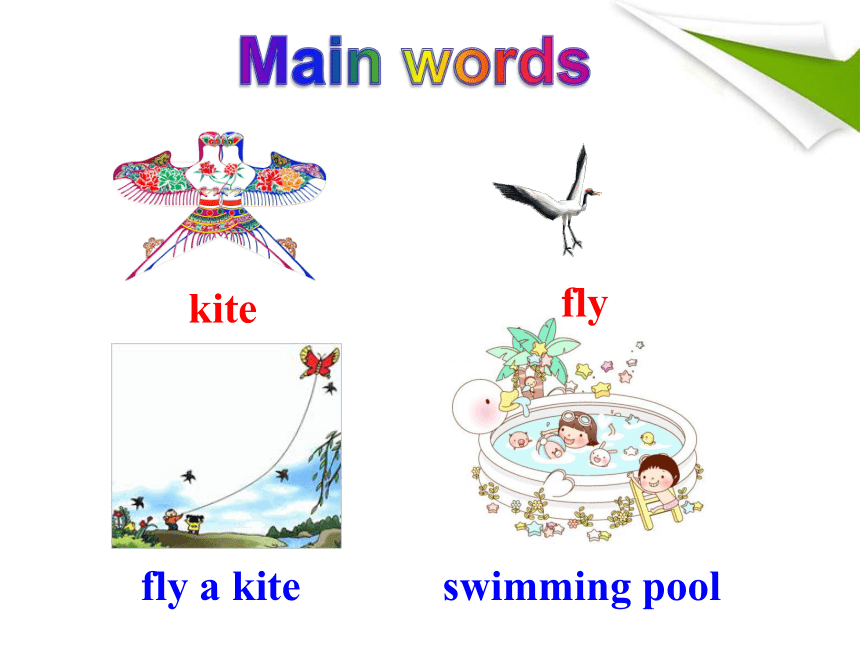
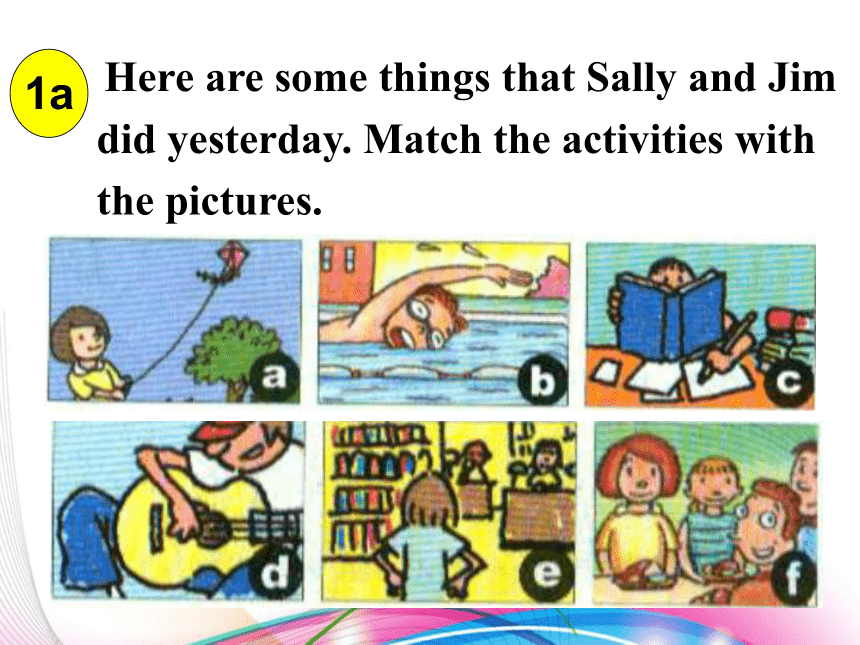

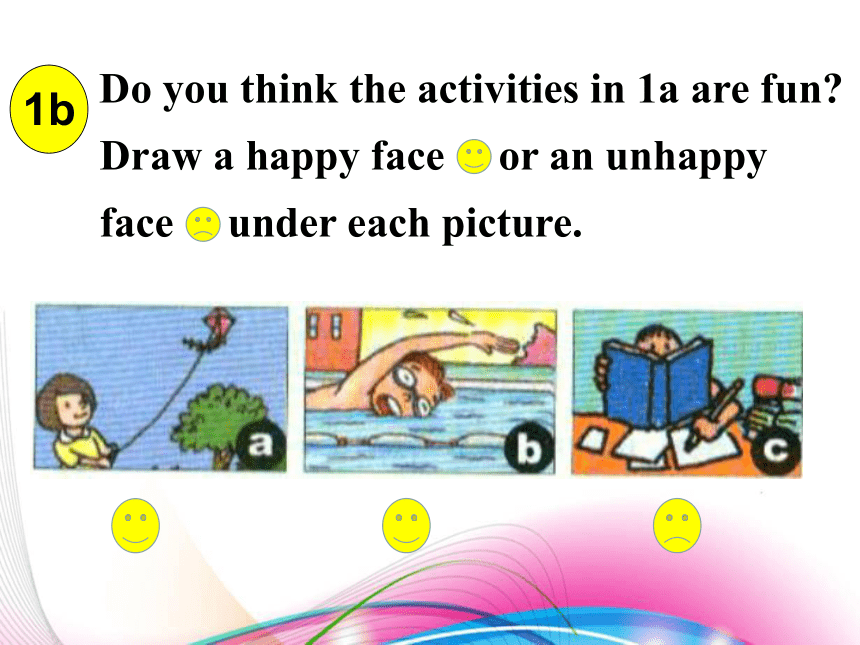
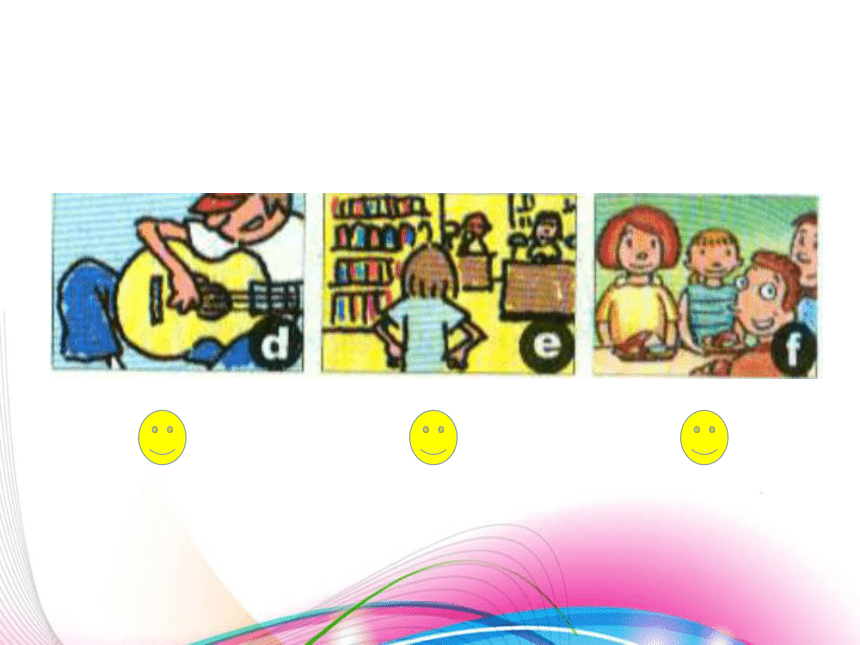
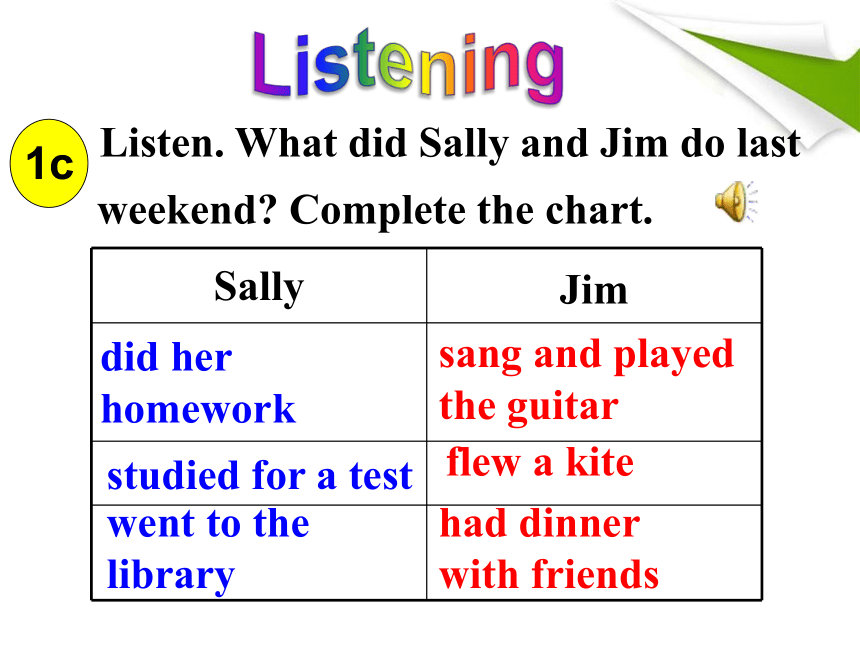
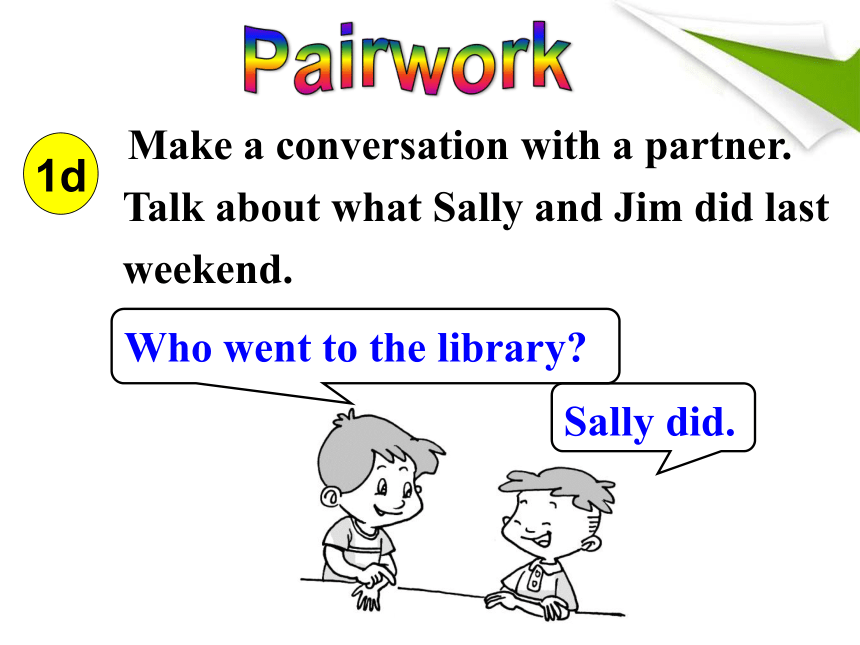
文档简介
课件49张PPT。What did you do
last weekend?Unit 12
Section B
1a-2c* 教师寄语:Don’t let yesterday use up too much of today. 别让昨天耽误今天。
【学习目标】【学习重点】:
继续进一步学习和谈论过去事件。
根据文章找寻关键信息,提高阅读能力。Let's watch and learn!My last weekend was interesting. I visited my grandparents. They lived in a small village. I fed the chickens and sheep. I went fishing with my grandpa. Description Describe what you did on your last weekend to your classmates.My last weekend was boring. I stayed at home and did my homework on Saturday. I went to the park on Sunday morning, but it rained. So we went home and watched TV. kiteflyMain wordsfly a kite swimming pool Here are some things that Sally and Jim did yesterday. Match the activities with the pictures.1a1. sang and played the guitar __
2. studied for a test __
3. had dinner with friends __
4. went to the library __
5. flew a kite __
6. swam in a swimming pool __dfabce Do you think the activities in 1a are fun? Draw a happy face or an unhappy face under each picture. 1b Listen. What did Sally and Jim do last weekend? Complete the chart. Listening1cstudied for a testwent to the librarysang and played
the guitarflew a kitehad dinner with friends Make a conversation with a partner. Talk about what Sally and Jim did last weekend.PairworkWho went to the library? Sally did.1dDid Sally go out on Saturday? No, she didn’t. She did her homework and studied for a test. Then what did she do on Sunday? She went to the library.It was relaxing.Well. He sang and played the guitar on Saturday morning. How was Jim’s last weekend? Really? What did he do on Saturday? No, he didn’t. He flew a kite in the park on Sunday afternoon. Did Jim do his homework on Sunday? What about Sunday evening? Well, he had dinner with friends. Did you do anything interesting last weekend? Make a conversation. Ask what your partner did last weekend. PairworkNot really, but I visited my sister. 1eHi, Alice. What did you do last weekend? I went to the cinema with my friends. Hello, Bob. Did you go out last weekend? Yes, I did. I camped by the lake with my uncle. Let’s go and see what kind of animals are people afraid of.Eevrybody! Go! Go! Go!crocodile
['kr?k?dail] 鳄鱼 lizard ['liz?d]蜥蜴 whale 鲸鱼 snake 蛇 tiger 老虎 lion 狮子 What kinds of animals are people sometimes afraid of? Why? Make a list.I think people are afraid of tigers, lions and snakes because they’re scary. 2aspiderwolfbearmousetigerslionssnakesput uptentput up a tent high schoolMain wordsscaredwake up Read about Lisa’s weekend. Tick (√) the right pictures. ReadingFast Readingtheir air ride was shortwent camping in a small villagemade a fire to cook food√2b√shouted to their parents two tigers sleeping near the fire √Careful ReadingRead the article again and answer the questions below.1. How was Lisa’s weekend?
2. Where did Lisa and her family go last weekend?
3. How did Lisa feel when she saw the snake?4. What did Lisa and her sister do?
5. What did their parents do? Why did they do that?
6. What lesson did Lisa learn from the weekend? 先认真读这六个问题,掌握其意思。
带着问题再去读短文,在短文中寻找回答问题的相关依据。比如:回答第一题的依据是第一段的最后一句话“Last weekend was interesting and scary.” 第二题的依据是第二段的第一句话“We went camping in a small village
in India.”
3. 第三到第五小题的依据是短文中第三段,清晨他们看到蛇后,所发生的事情。最后一小题的回答依据是短文的最后三句话。How was Lisa’s last weekend?
________________________________
Where did Lisa and her family go last weekend?
________________________________
How did Lisa feel when she saw the snake?
________________________________She felt very scared. It was interesting but scary. They went to a small village in India. Check the answers4. What did Lisa and her sister do?
______________________________
______________________
5. What did their father do?
_____________________________ ____________
Why did he do that?
_______________________________Her father jumped up and down in their tent. He wanted to wake up the snake. They shouted to their parents to let them know the danger.6. What lesson did Lisa learn from the weekend?
________________________________ __________________________________________________Snakes don’t have ears but they can feel things moving. It’s important not to go near a snake. ___ snake went into the forest
___ put up our tents and cooked food
___ learned a useful lesson
___ saw a snake and shouted to parents for help Put the phrases in order according to the passage. The use them to retell the story. Reading2c___ snakes can’t hear but feel things moving
___ my dad jumped up and down in his tent
___ took a bus to a small village in India
___ told stories under the moon, then went to sleep认真阅读八个句子,了解句子意思,掌握它们所指代的八个事件:蛇进入森林中;撑起帐篷,做饭;学到一条有用的教训;看到一条蛇向父母求助;蛇听不到声音但能感觉到事物的移动;我的爸爸在帐篷里跳上跳下;乘公共汽车去印度的一个小村庄;在月光下讲故事,然后睡觉。阅读指导 2. 带着这八个小事件,再去反复读短文,分析这个八个事件发生的时间先后,然后将它们排成正确的顺序。最后,再按所排列的顺序读一遍这八句话,确保顺序正确。___ snake went into the forest
___ put up our tents and cooked food
___ learned a useful lesson
___ saw a snake and shouted to parents for help
___ snakes can’t hear but they can feel things moving24Check the answers678___ my dad jumped up and down in his tent
___ took a bus to a small village in India
___ told stories under the moon, then went to sleep1351. two weeks ago 两星期前,一段时间 + ago意为“多长时间之前”,是表达过去的时间。它常与一般过去时态连用。
三天前,我们参观了自然历史博物馆。
We visited the Natural History Museum
three days ago.
【辨析】before 意为“在……之前”,Language points后接时间的点;表示“在某 个时间点之前”,但不一定用于一般过去时态。例如:
我常在七点钟前去上学。
I usually go to school before seven.
此外,before也可以单独用,意为“以前”,可用于一般过去时态中。例如: 以前我不知道那件事情。
I didn’t know that before.
2. put up 意为“搭起;举起”
让我们将帐篷搭起来吧。
Let’s put up the tent.
如果你有什么问题,请举起手来。
If you have any questions, please put up your hands. 3. I was so tired that I went to sleep early.
我太疲劳了,以至于早早就睡觉了。
句式结构“so + 形容词 + that … ”,意为 “如此……以至于”
李老师的课如此有趣,以至于我们都喜欢他的课。
Mr. Li’s classes are so fun that we all love his classes. Paul is so lazy that he doesn’t go to work.
“so…that”可以和“too…to…”句式结构互换同义句。例如:
Paul is too lazy to go to work.
4. wake up 唤醒; 后面可以跟名词或代词; 跟名词时可以放在wake up的后面或中间; 但是如果是跟代词的话应放于 wake up 的中间。如: 早上你常什么时候醒来?
When do you usually wake up?
不要如此大声说话,你会将他们吵醒。
Don’t speak so loud. You’ll wake them up.
5. see/watch/feel/hear sb. doing sth. 看到/观察到/觉得/听到某人在做某事
我们能听到水从山上流下来的声音。
We can hear water running from the mountain.ago, tent, surprise, moon, scared, move, start, into1. She went ____ the kitchen to cook some food.
2. The ______ circles (围绕) the earth every 28 days.
3. They came to visit China two days ____.
4. Do you know how to put up a ____? tentintoagomoon选词填空。Exercise5. She got a great _________ when she got the Iphone 5.
6. My grandparents _______ to the countryside last year. They lived with my uncle in a village.
7. She _______ to learn English when she was ten.
8. She was really ______ to cross the rope way.surprisemovedstartedscaredHomework一、熟读2b中的短文,并试着复述短文。
二、复习并总结短文中出现的词组及句 型;并用下列词组或句型造句。
1. high school 2. put up
3. so … that … 4. get a surprise5. see sb. doing sth.
6. feel sb. doing sth.
shout to …
8. jump up and down
9. wake up
10. It’s important (not) to do sth.【快乐链接】记忆口决 记忆的根本在于背诵, 记忆的基础在于理解; 记忆的窍门在于重复, 记忆的措施在于整理; 记忆的助手在于联想, 记忆的动力在于应用。II、翻译官
1. 高中___________________ 2. 搭帐篷_____________________
3. 生火___________________ 4. each other ____________________
5. so…that…_______________ 6. look out of ___________________
7. 上上下下 _______________ 8. 把…弄醒 ___________________
9. 对…喊__________________ 10. learn from ___________________
11. 吃惊 __________________ 12. useful lesson _________________
last weekend?Unit 12
Section B
1a-2c* 教师寄语:Don’t let yesterday use up too much of today. 别让昨天耽误今天。
【学习目标】【学习重点】:
继续进一步学习和谈论过去事件。
根据文章找寻关键信息,提高阅读能力。Let's watch and learn!My last weekend was interesting. I visited my grandparents. They lived in a small village. I fed the chickens and sheep. I went fishing with my grandpa. Description Describe what you did on your last weekend to your classmates.My last weekend was boring. I stayed at home and did my homework on Saturday. I went to the park on Sunday morning, but it rained. So we went home and watched TV. kiteflyMain wordsfly a kite swimming pool Here are some things that Sally and Jim did yesterday. Match the activities with the pictures.1a1. sang and played the guitar __
2. studied for a test __
3. had dinner with friends __
4. went to the library __
5. flew a kite __
6. swam in a swimming pool __dfabce Do you think the activities in 1a are fun? Draw a happy face or an unhappy face under each picture. 1b Listen. What did Sally and Jim do last weekend? Complete the chart. Listening1cstudied for a testwent to the librarysang and played
the guitarflew a kitehad dinner with friends Make a conversation with a partner. Talk about what Sally and Jim did last weekend.PairworkWho went to the library? Sally did.1dDid Sally go out on Saturday? No, she didn’t. She did her homework and studied for a test. Then what did she do on Sunday? She went to the library.It was relaxing.Well. He sang and played the guitar on Saturday morning. How was Jim’s last weekend? Really? What did he do on Saturday? No, he didn’t. He flew a kite in the park on Sunday afternoon. Did Jim do his homework on Sunday? What about Sunday evening? Well, he had dinner with friends. Did you do anything interesting last weekend? Make a conversation. Ask what your partner did last weekend. PairworkNot really, but I visited my sister. 1eHi, Alice. What did you do last weekend? I went to the cinema with my friends. Hello, Bob. Did you go out last weekend? Yes, I did. I camped by the lake with my uncle. Let’s go and see what kind of animals are people afraid of.Eevrybody! Go! Go! Go!crocodile
['kr?k?dail] 鳄鱼 lizard ['liz?d]蜥蜴 whale 鲸鱼 snake 蛇 tiger 老虎 lion 狮子 What kinds of animals are people sometimes afraid of? Why? Make a list.I think people are afraid of tigers, lions and snakes because they’re scary. 2aspiderwolfbearmousetigerslionssnakesput uptentput up a tent high schoolMain wordsscaredwake up Read about Lisa’s weekend. Tick (√) the right pictures. ReadingFast Readingtheir air ride was shortwent camping in a small villagemade a fire to cook food√2b√shouted to their parents two tigers sleeping near the fire √Careful ReadingRead the article again and answer the questions below.1. How was Lisa’s weekend?
2. Where did Lisa and her family go last weekend?
3. How did Lisa feel when she saw the snake?4. What did Lisa and her sister do?
5. What did their parents do? Why did they do that?
6. What lesson did Lisa learn from the weekend? 先认真读这六个问题,掌握其意思。
带着问题再去读短文,在短文中寻找回答问题的相关依据。比如:回答第一题的依据是第一段的最后一句话“Last weekend was interesting and scary.” 第二题的依据是第二段的第一句话“We went camping in a small village
in India.”
3. 第三到第五小题的依据是短文中第三段,清晨他们看到蛇后,所发生的事情。最后一小题的回答依据是短文的最后三句话。How was Lisa’s last weekend?
________________________________
Where did Lisa and her family go last weekend?
________________________________
How did Lisa feel when she saw the snake?
________________________________She felt very scared. It was interesting but scary. They went to a small village in India. Check the answers4. What did Lisa and her sister do?
______________________________
______________________
5. What did their father do?
_____________________________ ____________
Why did he do that?
_______________________________Her father jumped up and down in their tent. He wanted to wake up the snake. They shouted to their parents to let them know the danger.6. What lesson did Lisa learn from the weekend?
________________________________ __________________________________________________Snakes don’t have ears but they can feel things moving. It’s important not to go near a snake. ___ snake went into the forest
___ put up our tents and cooked food
___ learned a useful lesson
___ saw a snake and shouted to parents for help Put the phrases in order according to the passage. The use them to retell the story. Reading2c___ snakes can’t hear but feel things moving
___ my dad jumped up and down in his tent
___ took a bus to a small village in India
___ told stories under the moon, then went to sleep认真阅读八个句子,了解句子意思,掌握它们所指代的八个事件:蛇进入森林中;撑起帐篷,做饭;学到一条有用的教训;看到一条蛇向父母求助;蛇听不到声音但能感觉到事物的移动;我的爸爸在帐篷里跳上跳下;乘公共汽车去印度的一个小村庄;在月光下讲故事,然后睡觉。阅读指导 2. 带着这八个小事件,再去反复读短文,分析这个八个事件发生的时间先后,然后将它们排成正确的顺序。最后,再按所排列的顺序读一遍这八句话,确保顺序正确。___ snake went into the forest
___ put up our tents and cooked food
___ learned a useful lesson
___ saw a snake and shouted to parents for help
___ snakes can’t hear but they can feel things moving24Check the answers678___ my dad jumped up and down in his tent
___ took a bus to a small village in India
___ told stories under the moon, then went to sleep1351. two weeks ago 两星期前,一段时间 + ago意为“多长时间之前”,是表达过去的时间。它常与一般过去时态连用。
三天前,我们参观了自然历史博物馆。
We visited the Natural History Museum
three days ago.
【辨析】before 意为“在……之前”,Language points后接时间的点;表示“在某 个时间点之前”,但不一定用于一般过去时态。例如:
我常在七点钟前去上学。
I usually go to school before seven.
此外,before也可以单独用,意为“以前”,可用于一般过去时态中。例如: 以前我不知道那件事情。
I didn’t know that before.
2. put up 意为“搭起;举起”
让我们将帐篷搭起来吧。
Let’s put up the tent.
如果你有什么问题,请举起手来。
If you have any questions, please put up your hands. 3. I was so tired that I went to sleep early.
我太疲劳了,以至于早早就睡觉了。
句式结构“so + 形容词 + that … ”,意为 “如此……以至于”
李老师的课如此有趣,以至于我们都喜欢他的课。
Mr. Li’s classes are so fun that we all love his classes. Paul is so lazy that he doesn’t go to work.
“so…that”可以和“too…to…”句式结构互换同义句。例如:
Paul is too lazy to go to work.
4. wake up 唤醒; 后面可以跟名词或代词; 跟名词时可以放在wake up的后面或中间; 但是如果是跟代词的话应放于 wake up 的中间。如: 早上你常什么时候醒来?
When do you usually wake up?
不要如此大声说话,你会将他们吵醒。
Don’t speak so loud. You’ll wake them up.
5. see/watch/feel/hear sb. doing sth. 看到/观察到/觉得/听到某人在做某事
我们能听到水从山上流下来的声音。
We can hear water running from the mountain.ago, tent, surprise, moon, scared, move, start, into1. She went ____ the kitchen to cook some food.
2. The ______ circles (围绕) the earth every 28 days.
3. They came to visit China two days ____.
4. Do you know how to put up a ____? tentintoagomoon选词填空。Exercise5. She got a great _________ when she got the Iphone 5.
6. My grandparents _______ to the countryside last year. They lived with my uncle in a village.
7. She _______ to learn English when she was ten.
8. She was really ______ to cross the rope way.surprisemovedstartedscaredHomework一、熟读2b中的短文,并试着复述短文。
二、复习并总结短文中出现的词组及句 型;并用下列词组或句型造句。
1. high school 2. put up
3. so … that … 4. get a surprise5. see sb. doing sth.
6. feel sb. doing sth.
shout to …
8. jump up and down
9. wake up
10. It’s important (not) to do sth.【快乐链接】记忆口决 记忆的根本在于背诵, 记忆的基础在于理解; 记忆的窍门在于重复, 记忆的措施在于整理; 记忆的助手在于联想, 记忆的动力在于应用。II、翻译官
1. 高中___________________ 2. 搭帐篷_____________________
3. 生火___________________ 4. each other ____________________
5. so…that…_______________ 6. look out of ___________________
7. 上上下下 _______________ 8. 把…弄醒 ___________________
9. 对…喊__________________ 10. learn from ___________________
11. 吃惊 __________________ 12. useful lesson _________________
同课章节目录
- Unit 1 Can you play the guitar?
- Section A
- Section B
- Unit 2 What time do you go to school?
- Section A
- Section B
- Unit 3 How do you get to school?
- Section A
- Section B
- Unit 4 Don't eat in class.
- Section A
- Section B
- Unit 5 Why do you like pandas?
- Section A
- Section B
- Unit 6 I'm watching TV.
- Section A
- Section B
- Review of Units 1-6
- Unit 7 It's raining!
- Section A
- Section B
- Unit 8 Is there a post office near here?
- Section A
- Section B
- Unit 9 What does he look like?
- Section A
- Section B
- Unit 10 I'd like some noodles.
- Section A
- Section B
- Unit 11 How was your school trip?
- Section A
- Section B
- Unit 12 What did you do last weekend?
- Section A
- Section B
